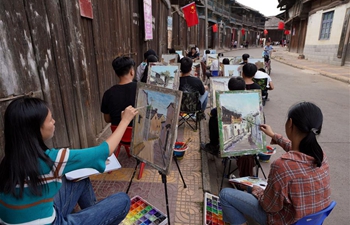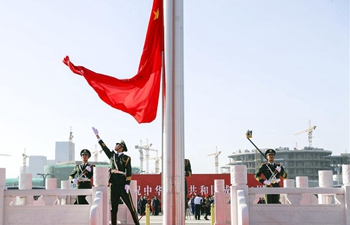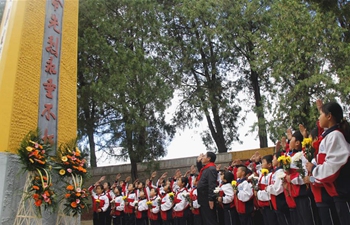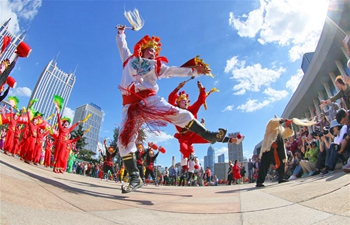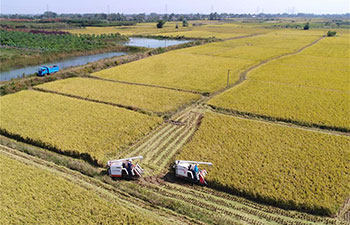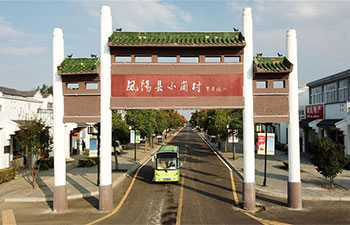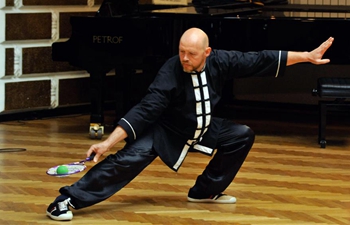
Photo taken on Sept. 14 shows the crowded Al-Mutanabi Street in Baghdad, Iraq. Al-Mutanabi Street is a unique cultural place located in downtown Baghdad, which is reviving in the Iraqi capital after many years of insecurity and economic crises. (Xinhua/Khalil Dawood)
BAGHDAD, Oct. 1 (Xinhua) -- Al-Mutanabi Street is a unique cultural place located in downtown Baghdad, which is reviving in the Iraqi capital after many years of insecurity and economic crises.
The cultural iconic location of Mutanabi Street has a history of hundreds of years, but in the last century the street has turned to a gathering place for Baghdad intellectuals.
The street is the historic center of Baghdad bookselling industry, filled with publishing houses, bookstores and dozens of outdoor book stalls. On weekends, there is a bustling book market.
Named after the 10th-century classical Iraqi poet Al-Mutanabbi, the street is considered as the heart and soul of the Baghdad literacy and intellectual community.
The book market is one of the rare areas in Baghdad that researchers, students and intellectuals can find foreign books and magazines, particularly English ones.
Ali al-Saadi, 50 years old and a frequent visitor to Mutanabi, told Xinhua that he usually comes to al-Mutanabi to get different kinds of books and meet some intellectuals, opinion-makers and sometimes artists. This street brings together cultures of different Iraqi factions.
"In addition to buying books, there are political and cultural symposiums held in Mutanabi book market discussing various topics," he said.
Some people who visit Mutanabi Street mainly on Friday are not so interested in buying books as they are taking part in the events hosted in the area.
"Such gatherings provide a chance for the audience to discuss face-to-face with elite and highly educated people," Saadi added.
"In general, this place teaches people the culture of moderation and rejection to violence and extremism, which Iraq has long been suffering," Saadi concluded.
Mutanabi Street was attacked by a suicide car bombing in March 2007, leaving some 26 people killed and more than 50 others injured.
The huge blast burned many book stores and destroyed dozens of stalls that left flamed papers spread everywhere in al-Mutanabi Street.
For his part, Sattar Mohsen, 58 years old and a publishing house owner, told Xinhua that "there are many publishing houses that deal with Arabic, Iraqi and foreign publications in al-Mutanabi."
"Most popular publications are religious books, literary and religious criticism as well as novels etc.," Mohsen said.
Mohsen believes more than one purpose were behind the terrorist attack in 2007, including that the extremists were targeting the culture that gives people awareness.
"What we are doing here is providing people with higher level of culture that would limit terrorism and extremism. We simply think reading would decrease spilling blood of innocent people," Mohsen added.
Every Friday, Mutanabi Street is more like a festival as hundreds of people from Baghdad districts and from other Iraqi provinces converge the street, with some visiting old bookshops looking for rare books which can only be found there.
Many others spend their day at the old Shahbander coffee shop, one of the most famous coffee shops in Baghdad, as customers at the entrance of the place would enjoy view of large number of old black and white photos of most popular Iraqi figures from politicians, artists, poets to intellectuals.
The customers of Shahbander coffee shop would be attracted by the smell of fresh Shisha tobacco, or Narjeelah, which gains immense popularity among dozens of old and young men who sit chitchatting and socializing.
The visitors of al-Mutanabi Street would also enjoy its al-Qishla clock tower and its public square located at the eastern bank of Tigris River that bisects Baghdad.
"Visiting al-Mutanabi Street means a lot to many Baghdadis. It is our heritage and part of our national identity," Mohsen concluded.
